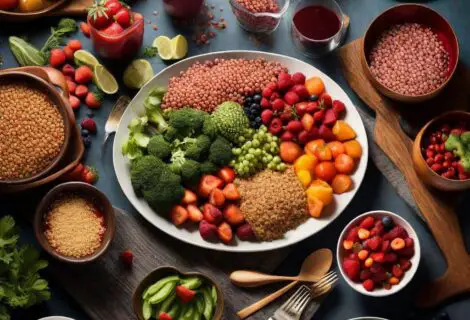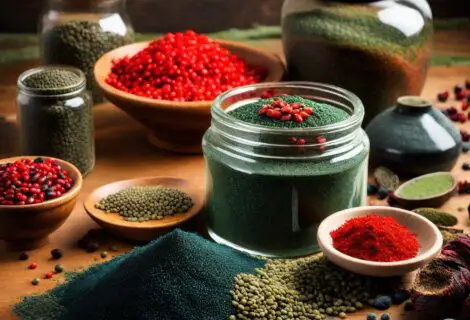Beat the Bloat: 6 Foods Proven to Enhance Your Digestive Health
Introduction
Have you ever experienced that uncomfortable, bloated feeling after a meal? Like your stomach is playing a not-so-funny joke on you? Well, you’re not alone. Today, we’ll briefly explore six foods that are not just nutritious but also champions in calming your digestive system. Welcome to this space where food is not just a source of pleasure, but also a remedy for discomfort.
How Diet Can Reduce the Risk of Obesity, Diabetes, and Heart Disease
Understanding Bloating: More Than Just Discomfort
Bloating can feel like an unwelcome intruder after a hearty meal. It’s your body’s way of saying, “Hey, something’s not right down here!” Often a result of gas build-up or disturbances in the digestive process, bloating is more than just an inconvenience; it’s a signal from your body that deserves attention.
1. Yogurt: The Probiotic Champion
Beneficial Bacteria at Work
Yogurt isn’t just a tasty snack; it’s a powerhouse of probiotics. These beneficial bacteria play a crucial role in balancing your gut’s ecosystem, aiding digestion, and keeping bloating at bay. Including yogurt in your diet is like giving your gut a helping hand in maintaining harmony.
2. Ginger: Nature’s Digestive Aid
Soothing Your Stomach Naturally
Ginger has a longstanding reputation as a natural remedy for digestive issues. Its compounds aid in relaxing the intestinal muscles, preventing the discomfort and bloating associated with indigestion. A slice of ginger in your tea might just be the soothing touch your stomach needs.
3. Bananas: The Fiber-Filled Friend
Keeping Things Moving
Bananas are not just a convenient snack; they’re a rich source of fiber. Fiber is essential for regular bowel movements, preventing constipation, and reducing bloating. Think of bananas as a gentle, natural digestive regulator.
4. Whole Grains: Prebiotic Power
Nourishing the Gut
Whole grains are a vital source of prebiotics, the lesser-known cousins of probiotics. Prebiotics nourish the beneficial bacteria in your gut, promoting a healthy digestive system. Regular consumption of whole grains can contribute significantly to reducing digestive discomfort.
5. Leafy Greens: Magnesium-Rich Movers
Easing Digestion with Greens
Leafy greens are not just for salads; they’re packed with magnesium, a mineral that plays a critical role in digestive health. Including greens in your diet can help regulate bowel movements and reduce symptoms of bloating.
The Benefits of Leafy Green Vegetables for Your Health
6. Fennel: The Natural Gas Reliever
A Gentle Approach to Gas
Fennel, with its unique flavor, is also known for its ability to alleviate gas and bloating. Its compounds relax the smooth muscles of the digestive tract, aiding in the reduction of gas and discomfort. Fennel isn’t just a culinary delight; it’s a gentle remedy for an upset stomach.
Combining Foods for Maximum Benefit
When it comes to digestive health, synergy matters. Combining these gut-friendly foods can enhance their individual benefits. A yogurt parfait with bananas and a sprinkle of whole grains for breakfast, or a salad with leafy greens and fennel for lunch, can be delicious ways to support your digestive health.
Lifestyle Factors Affecting Digestion
Remember, diet is just one piece of the digestive wellness puzzle. Hydration, regular exercise, and managing stress are equally important in maintaining a healthy digestive system. A holistic approach to lifestyle can significantly impact your gut health.
Precautions and Considerations
While these foods are generally beneficial, everyone’s digestive system is unique. What works for one person may not work for another. It’s important to listen to your body and consult healthcare professionals for personalized advice.
Conclusion
Incorporating these six foods into your diet can be a game-changer in managing bloating and enhancing overall digestive health. But remember, balance is key. It’s about creating a harmonious relationship between what you eat and how you live. Here’s to a happier, healthier gut! Check out this video for additional recommendations to reduce gas:
FAQs
- Can these foods cure digestive diseases? While they can alleviate symptoms, they are not a cure. It’s always best to consult with your personal healthcare professionals for specific conditions.
- How quickly can I expect to see results? This varies from person to person. Some may see improvements within a few days, while for others, it might take longer.
- Are there any side effects to these foods? These foods are generally safe, but it’s important to consider individual allergies or intolerances.
- Can I combine these foods with other treatments? Yes








